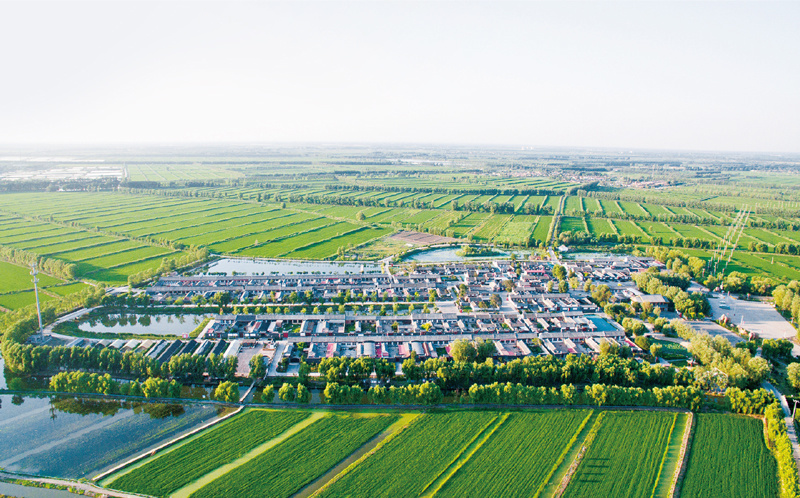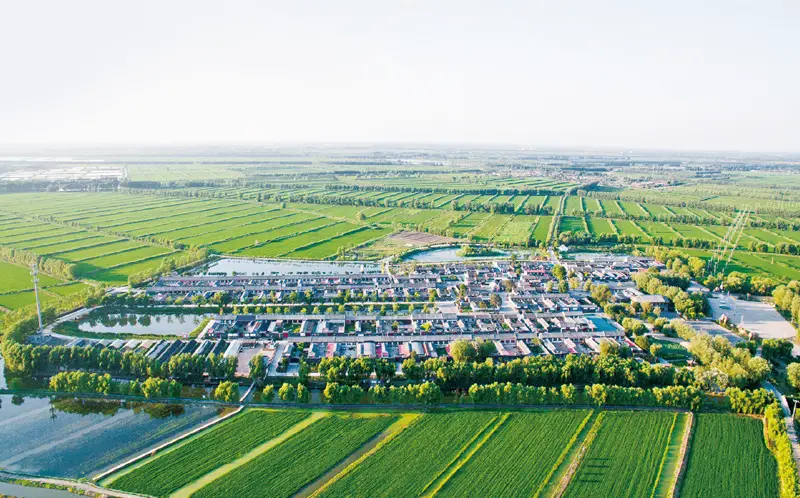By Qiao Yang, Wu Shaomin, People's Daily

Photo shows Xiaoxinmatou village, Huangzhuang township, Baodi district, north China's Tianjin municipality. (Photo courtesy of the publicity department of the Communist Party of China Baodi district committee)
Xiaoxinmatou village, located in Baodi district, north China's Tianjin municipality, is one of the first villages in the district to develop rural tourism.
In ancient times, it had a pier where grains were transported, so the village is dubbed "millennium ancient ferry."
Today, clean energy is making the village's development greener and greener, and the village has been listed as a key rural tourism village at national level.
Thanks to a "whole-electrified kitchen" program recently piloted in the village, villager Hong Yuliang's kitchen has been equipped with a whole set of electric cooking appliances, including an electric steam box and an electric oven. There's no flame in the kitchen at all.
"These appliances are powerful and they cook fast. They have cooled down the kitchen a lot," Hong told People's Daily. These appliances also help protect the ecological environment, he added.
According to Gao Zhiwei, deputy director of the marketing division of the Baodi branch of the State Grid, the electricity consumed by "whole-electrified kitchens" is mainly generated by wind turbines.
"The kitchens are flameless, exhaust gas-free, healthy, environmentally friendly, safe and clean," Gao said.
"Whole-electrified kitchens" are 30 percent to 60 percent more efficient than traditional gas-consuming ones, and they can reduce carbon emission by 30 to 50 percent.
At the end of 2021, the first wind farm in Baodi district was put into operation. Located to the north of Xiaoxinmatou village, the wind farm supplies all 88 households in the village with green electricity. The wind farm is able to generate 75 million kilowatt-hours of electricity on an annual basis.
Xiaoxinmatou village is a miniature of Baodi district's efforts to promote clean energy and low-carbon development. An official with the district's development and reform commission told People's Daily that Baodi has built wind farms in nine of its townships.
As of the end of July, the installed renewable power generation capacity had hit 313,000 kilowatt-hours, accounting for nearly half of the total installed power capacity of the district. Besides, the district is also home to 3,345 users of distributed photovoltaic power generation.
Exploiting the advantages of "green electricity" and rich water resources, Xiaoxinmatou village has fully released its potential in developing green economy.
The village has launched a series of featured tourism projects that combine sightseeing and agriculture, such as fish and crab farming in paddy fields. So far, all the 2,700 mu (180 hectares) of paddy fields in the village have been engaged in crab farming.
Both the crabs and rice in the paddy fields are in high demand, said Wang Xiaodong, party chief of Huangzhuang township, which administers Xiaoxinmatou village. According to him, the township is hosting a series of agricultural activities to boost rural tourism.
Now, 32 households in Xiaoxinmatou village run agritainment facilities, and the village received over 200,000 visitors in 2021.
It is learned that visitors can record their low-carbon behaviors in the village on a mobile application, such as their walking steps, automobile charging, and meals ordered from "whole-electrified kitchens," and convert them into virtual "carbon coins."
Awarding visitors for their green travels and low-carbon lifestyles helps improve public awareness of energy conservation and carbon reduction, said Liang Haishen with the Baodi branch of the State Grid.
Baodi district will further promote energy reform by implementing a new batch of photovoltaic, wind power and other new energy projects, to promote green and low-carbon development, said Liang.
The district will also study the crossover development between photovoltaic power generation and other sectors such as fishery, agricultural green houses and smart charging poles, to lead a lifestyle that's more low-carbon and further advance rural vitalization, Liang told People's Daily.
In ancient times, it had a pier where grains were transported, so the village is dubbed "millennium ancient ferry."
Today, clean energy is making the village's development greener and greener, and the village has been listed as a key rural tourism village at national level.
Thanks to a "whole-electrified kitchen" program recently piloted in the village, villager Hong Yuliang's kitchen has been equipped with a whole set of electric cooking appliances, including an electric steam box and an electric oven. There's no flame in the kitchen at all.
"These appliances are powerful and they cook fast. They have cooled down the kitchen a lot," Hong told People's Daily. These appliances also help protect the ecological environment, he added.
According to Gao Zhiwei, deputy director of the marketing division of the Baodi branch of the State Grid, the electricity consumed by "whole-electrified kitchens" is mainly generated by wind turbines.
"The kitchens are flameless, exhaust gas-free, healthy, environmentally friendly, safe and clean," Gao said.
"Whole-electrified kitchens" are 30 percent to 60 percent more efficient than traditional gas-consuming ones, and they can reduce carbon emission by 30 to 50 percent.
At the end of 2021, the first wind farm in Baodi district was put into operation. Located to the north of Xiaoxinmatou village, the wind farm supplies all 88 households in the village with green electricity. The wind farm is able to generate 75 million kilowatt-hours of electricity on an annual basis.
Xiaoxinmatou village is a miniature of Baodi district's efforts to promote clean energy and low-carbon development. An official with the district's development and reform commission told People's Daily that Baodi has built wind farms in nine of its townships.
As of the end of July, the installed renewable power generation capacity had hit 313,000 kilowatt-hours, accounting for nearly half of the total installed power capacity of the district. Besides, the district is also home to 3,345 users of distributed photovoltaic power generation.
Exploiting the advantages of "green electricity" and rich water resources, Xiaoxinmatou village has fully released its potential in developing green economy.
The village has launched a series of featured tourism projects that combine sightseeing and agriculture, such as fish and crab farming in paddy fields. So far, all the 2,700 mu (180 hectares) of paddy fields in the village have been engaged in crab farming.
Both the crabs and rice in the paddy fields are in high demand, said Wang Xiaodong, party chief of Huangzhuang township, which administers Xiaoxinmatou village. According to him, the township is hosting a series of agricultural activities to boost rural tourism.
Now, 32 households in Xiaoxinmatou village run agritainment facilities, and the village received over 200,000 visitors in 2021.
It is learned that visitors can record their low-carbon behaviors in the village on a mobile application, such as their walking steps, automobile charging, and meals ordered from "whole-electrified kitchens," and convert them into virtual "carbon coins."
Awarding visitors for their green travels and low-carbon lifestyles helps improve public awareness of energy conservation and carbon reduction, said Liang Haishen with the Baodi branch of the State Grid.
Baodi district will further promote energy reform by implementing a new batch of photovoltaic, wind power and other new energy projects, to promote green and low-carbon development, said Liang.
The district will also study the crossover development between photovoltaic power generation and other sectors such as fishery, agricultural green houses and smart charging poles, to lead a lifestyle that's more low-carbon and further advance rural vitalization, Liang told People's Daily.
 Menu
Menu
 "Millennium ancient ferry" in N China's Tianjin sees prospering development of green tourism
"Millennium ancient ferry" in N China's Tianjin sees prospering development of green tourism
















